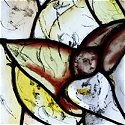|
The phrase hester panim (הֶסְתֵר פָּנִים) means "hiding of the face." It is often used when discussing the Book of Esther, where God's Name isn't mentioned even once, yet the hidden Presence is manifest in the outcome of the story. In this sense of the term, hester panim is somewhat like the sun on an overcast day: Just because you don't see it doesn't mean it isn't there. God's providential care for us is at work at all times, whether we perceive it or not.
The eye of emunah (faith) ultimately affirms: gam zu l'tovah (גַּם זוּ לְטוֹבָה), "this too is for good" (cp. Rom. 8:28). Notice that the affirmation is not gam zu tovah - "this is the good," but rather gam zu l'tovah - "this, too, is for good." Emunah "sees what is invisible" (2 Cor. 4:18) and understands (i.e., accepts) that the "present form of this world is passing away" for purposes that are good (1 Cor. 7:31). It affirms that underlying the surface appearance of life (chayei sha'ah) is a deeper reality (chayei olam) that is ultimately real, abiding, and ultimately designed for God's redemptive love to be fully expressed. In this world we must "see through" a mirror (i.e., indirectly) to begin to see the dawn of our eternal home; but one day we will behold God panim el panim (פָּנִים אֶל־פָּנִים), "face to face" (1 Cor. 13:12).
Among other things the story of Joseph reveals how God's hidden hand moves for good in our lives. Despite the betrayal of the pit, and the unjust suffering of the prison house, there was light, exaltation, and joy to come forth. God knows how to take our emptiness to yield "storehouses in Egypt..." As Joseph later told his brothers, "you meant evil against me, but God meant it for good" (Gen. 50:20). Resist the temptation to judge by mere appearances. Forbid your sorrow to blind the eyes of faith. Do not unjustly judge God's purposes or try to understand His ways; accept that He works all things together (συνεργέω) for good -- making even the very wrath of man to praise Him...
וּמֵעוֹלָם לא־שָׁמְעוּ לא הֶאֱזִינוּ
עַיִן לא־רָאָתָה אֱלהִים זוּלָתְךָ
יַעֲשֶׂה לִמְחַכֵּה־לוֹ
u'me·o·lam · lo · sham·u · lo · ha·e·zi·nu
a·yin · lo · ra·a·ta · E·lo·him · zu·la·te·kha
ya·a·seh · li·me·cha·keh · lo

"From eternity no one has heard or perceived by the ear,
no eye has seen a God beside you
who works for those who wait for him"
(Isa. 64:4)
Note that Isaiah 64 centers upon the need for mercy and healing from sin: "You have hidden your face from us, and have made us melt in the hand of our iniquities," though it appeals to the salvation of the LORD that "works for those who wait for Him." King David said something similar: "I cry out to God Most High, to God who is perfecting me" (Psalm 57:2). The Apostle Paul links Isaiah 64:4 with 1 Cor. 2:7-9 by stating that the wisdom of God's plan of salvation – the wisdom of God in mystery (θεοῦ σοφίαν ἐν μυστηρίῳ) - exceeds all expectations of human wisdom or design. Note that Paul added the phrase "neither have entered into the heart of man" (a phrase used elsewhere in the Torah) to indicate that God's salvation was utterly and unimaginably beyond all human apprehension in Yeshua's wonder and glory. This is fundamental to the "good news" of the gospel message itself: It is God's wisdom and salvation alone that heals, completes, and perfects us. God Himself works for those who are waiting for Him...
Hebrew Lesson
Proverbs 11:27 reading (click):
 |
|



